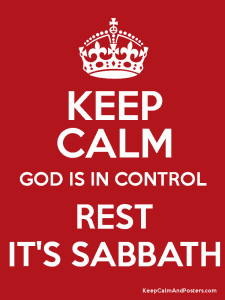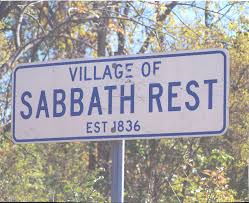The fourth commandment comes to us, not lightly, but as a strict and memorable principle. “Remember the Sabbath day, and keep it holy,” thundered God from Mount Sinai to the nascent Israelite nation gathered to hear his words. (Exodus 20:8-10). Strict, because over the centuries the church has resolutely upheld this principle of mandatory rest and memorable because it still conjures, in the minds of many, images of toys not played with, races not run, and televisions blacked out on “The Sabbath Day”. Coming from Canada, where things were a lot less rigid, I shudder when told of swings being chained together to prevent children from, God forbid, breaking the Sabbath by having fun.
And lest you think this a relic of a dark and misguided past, let me remind you it was only in 1994 that the Sunday Trading Act was passed here in Britain, allowing shops to open but restricting the opening times of larger shops. These restrictions were temporarily relaxed during the 2012 Olympics and Para Olympics, but it was, astonishingly, only in the 2015 summer budget that we saw the prospective repeal of almost 1700 years of Sunday Trading, reversing the enduring legacy of Constantine who first instituted Sunday trading restrictions in 321 AD when he declared the Roman Empire a Christian nation
For the sceptic, not to mention the Christian, memories and restrictions such as these can present more than sufficient reason for an outright rejection of Christianity, for it is not only rational arguments that derail belief in God, but emotional ones also. Logic may be the track by which we navigate our world, but emotions constitute the very air we breathe, capable of causing a derailment made all the more powerful by their sheer invisibility. By linking Sunday with boredom and inactivity, the church has done a good job of inoculating people to the truth of Christianity. Is this really what God had in mind when he gathered an immigrant people to himself and instructed them keep Sabbath holy?

Apparently Jesus thought not, Courting the fury of the religious elite of his day, Jesus seems to have fallen continuously foul of the Sabbath regulations imposed upon Israel, so continuously in fact that it begins to look suspiciously deliberate. Eating grain on the Sabbath could be deemed an oversight, but to encourage your disciples to do the same is open subversion; healing once during a Sabbath service is institutionally unwise, but to do so repeatedly is to practically beg for confrontation. So what are we to conclude? Was Jesus, the Son of God, God himself, reversing his own laws and displaying suspiciously bipolar characteristics, or has the church as a whole shot so wide of the mark that it have singularly failed to understand what God originally intended the Sabbath to be about?
In what follows, I want to take a brief step back in time and follow the history of the Sabbath command as it played out in the life of Israel and the early church. If we can understand its origin and initial meaning in the life of Israel, we have a far better chance of understanding its role in the present, and to do that, we need to go back to the very beginning of life on earth.
Where is this commandment rooted?
The fourth commandment finds its origin, not primarily at Sinai as many suppose, but in the creation mandate of Genesis 2:3 where God is said to have rested the seventh day and pronounced this day “holy”. From the start, then, we see that God makes a distinction; not all days are to be considered the same, some are different, set apart, known for their uniqueness. The distinction of work and rest is instituted as a creational concept, with one day in seven acting as a weekly reminder that work, as essential and important as it is, is never to be considered the end goal. Beyond work, lies the beckoning landscape of rest, forming a bedrock principle that will run throughout the entire Biblical narrative: God’s people are a resting people.

Now, bearing this in mind, if we take a magnifying glass to the creational text, we will see each step of the creating process concludes with the words “And there was evening and there was morning, the nth day”. This seems to be a way of bracketing the creative work done on that day, a sort of inclusio that indicates the completion and separation of one day before the beginning of the next. Interestingly, this literary format is used consistently to produce a highly structured narrative, until we come to the 7th day. The writer seems to have consciously broken away from the format he has been using and left this last day deliberately open-ended. If e step back and look at the picture as a whole, we see something very interesting; no matter how you understand the particulars of the 7th day, what we have here is a God who “rests, blesses, declares holy but intentionally leaves open” a period of creational time. This should, at the very least, make us sit up and pay attention.
Where is this commandment implemented?
The Sabbath command itself is found as part of the giving of the Law, given by God to Israel as he begins to formulate them into a nation, rather than the large, extended Abrahamic family they had been up to this point. Two passages most specifically communicate what is often called the “Moral Law” and where most people locate the beginning of the Sabbath Day regulation, Exodus 20 and Deuteronomy 5, (although we should bear in mind that this command was by no means unfamiliar to the Israelite nation, as we see in Exodus 16 where God’s provision of manna doesn’t extend to the 7th day and God specifically tells his people why; “The Lord has given you the Sabbath.” v 29). What’s interesting to me here is that while both lists closely imitate each other, the motivation for Sabbath keeping in each is different.
For whatever reason, Moses feels free to easily substitute one motivation for the other, sensing no apparent disagreement between the two. In Exodus 20, the Sabbath command is rooted in God’s creative activity: “for in six days the Lord made heaven and earth, the sea and all that is in them,” yet in Deuteronomy 5 the motivation shifts to his salvific, redeeming activity: “you shall remember that you were a slave in the land of Egypt, and the Lord your God brought you out of there with a mighty hand and an out-stretched arm. Therefore the Lord your God commanded you to keep the Sabbath day.” Same command but different motivation; why?
Yet again we see that the fourth command is more nuanced than is often realised, not only was it already fully operational, at whatever level, in the life of Israel before they heard God’s voice at Sinai, but it was also a much more complex regulation than just the one day in seven, for again a closer reading of the text teaches us that the Sabbath command doesn’t stand on its own but is to be understood as part of a whole system of Sabbath rest. The weekly Sabbath was one day in seven when God’s people were to rest/ remember their liberation from slavery; the yearly Sabbath was one year in seven when the land was to be allowed to rest/ be liberated from its work in producing food (Lev 25); and the Jubilee Sabbath was one year in 49 when a trumpet blast would announce rest/liberation/redemption/and freedom from debt and slavery. As the trumpet sounded, its freedom call brought liberation to both land and people, as ancestral property was restored to its original owners and people who had been bound in slavery were allowed to throw off their chains and walk free again. Sabbath for the average Israelite man or woman was so much more than just a period of rest every seventh day, It was a principle of redemption woven into Israel’s corporate life right from their very inception as a nation under God. The principle of looking ahead to a time of redemption was axiomatic to their identity as a people, and God made absolutely sure they never lost sight of this by weaving it into their annual calendar. So we must now add to our initial understanding of Sabbath as rest/ holiness/ blessing and open-endedness, the twin concepts of freedom and redemption.
How is it taught in the history of Israel?
The Sabbath principle is fierce and unbending; God’s people are to be Sabbath-remembering people. Yet as the history of Israel unfolds there is often little mention of the Sabbath as the nation struggles with idolatry and sin. It is the prophets who once again pick up the call to Sabbath–keeping, the greatest statement of such being found in Isaiah 61. Following on from Isaiah’s stern insistence on Sabbath observance in chapters 56 and 58, we come to that great passage in chapter 61 where Isaiah seemingly flings his arms wide with abandon, to declare liberty for the captives, restoration of sight to the blind, good news to the poor, and so on. The Spirit of the Lord upon him now instructs Isaiah to extend the Jubilee concept to include the idea of “healing” for all God’s people and all God’s land.
“All God’s people and all God’s land”- do we not hear more than just a faint echo, more than just a faint sense that somehow in our journey of understanding we have come full circle, back once again to the creation narrative where we started? Do not the first three chapters of Genesis tell us that all of creation has fallen into bondage and is in need of a saviour? Over the 2000 + years from Abraham to Isaiah God has been building upon this concept, connecting, connecting, connecting, as he moves from rest to freedom, from healing to renewal, from renewal to re-creation as he cries hope from the lips of his servant Isaiah, hope that is certain but still on the horizon, awaiting a better time and a better place.
*I am indebted in writing this article to Tom Wright for his excellent work, “Case study: Sabbath” found in his book, “Scripture and the Authority of God” (London, SPCK, 2013)

